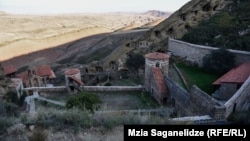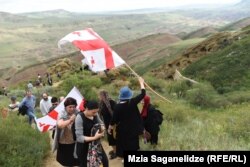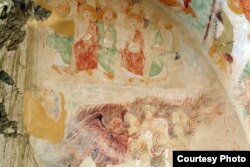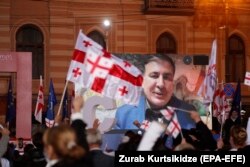Even in a country as obsessed by its medieval past as Georgia, monasteries do not regularly feature in national elections. A criminal investigation into an alleged border deal with Azerbaijan that impacts the iconic 6th-century Davit Gareji monastery complex, however, has changed that.
The case has sparked accusations that the Georgian government is using the investigation to foil a comeback by ex-Georgian President Mikheil Saakashvili’s United National Movement in Georgia's October 31 parliamentary elections.
Some observers contend that Russia, the northern neighbor of both Georgia and Azerbaijan, stands to benefit from the scandal.
Made up of 19 monasteries, some built into caves, Davit Gareji, located 25 kilometers from Tbilisi, spreads over 25 hectares of hilly, arid terrain in southeastern Georgia and northwestern Azerbaijan. Sacked by Seljud Turks, Mongols, and Safavid Persians alike, it once ranked as an esteemed center for learning and fresco painting. Today, it is viewed as an evocative symbol of Georgia’s nationhood.
But Azerbaijan and Georgia have never agreed on who owns what part of the complex. With no border treaty between the two states, Azerbaijani border guards blocked access to some parts of the complex altogether in 2019.
Earlier this month, that land controversy returned after Georgian government investigators charged that two Saakashvili government officials involved in 2006-2007 border talks with Baku had concealed a 1938 map that would have shown that 3,500 hectares of land conceded to Azerbaijan actually belonged to Georgia. The two former officials – Ivere Meliashvili, the ex-head of the Georgian foreign ministry office handling border talks, and Natalia Ilychova, the ex-chief inspector of the Georgian border police – face between 15 to 20 years in prison for allegedly violating Georgia’s territorial integrity.
Both deny any wrongdoing, and state that the 1938 map is inaccurate.
Some members of the Georgian opposition and civil society, however, call the investigation a government attempt to sway voters before the elections.
“The timing of the investigation, the pre-election context, the signs of a selective approach to the investigation and the populist statements made by the ruling party leaders violating the presumption of innocence raise suspicions that the investigation serves electoral purposes and is aimed at creating misconceptions about political opponents” of the government, anti-corruption watchdog Transparency International Georgia charged in an October 26 report on the parliamentary elections.
Saakashvili’s United National Movement (UNM), Georgia’s ruling party between 2004 and 2012, is the closest competitor to the ruling Georgian Dream party. In the latest opinion poll, an October 28 survey of 2,000 respondents by the French pollster IPSOS for the pro-Saakashvili media platform Mtavari Arkhi (Central Channel), the UNM and several smaller allies had 33 percent of the vote, compared with 40 percent for the Georgian Dream.
Some 48 parties and two election parties are running candidates for 150 parliamentary seats in the October 31 vote.
Prime Minister Giorgi Gakharia, however, declared on October 8 that the border investigation is not political and simply shows that no one gets special treatment in Georgia.
Nonetheless, Gakharia took a jab at Georgia’s ex-president: “[T]he criminal investigation will not be anything new for Mr. Saakashvili. This is not his first or second case,” he said.
In 2018, Saakashvili, Georgia’s president from 2004 until 2013, was sentenced in absentia to six years in prison on charges of abuse of power.
The Georgian government claims that it launched its investigation only after the defense ministry provided maps that showed that the Saakashvili-era concession of territory, which was never finalized, was incorrect.
Defense Minister Irakli Gharibashvili, a co-founder of the Georgian Dream and a former prime minister, does not conceal his hostility toward Saakashvili and the UNM, though. In an October 28 Facebook post, he castigated Saakashvili as a “traitor” for the 2008 Russia-Georgia war, and called for the United National Movement to be “abolished” after the vote.
Some fear that Russia intends to capitalize on the scandal.
“We know that Russia is interested in ruining relations between Georgia, Azerbaijan, and Turkey. This is a geopolitical triangle, where Georgia is a strategic partner,” commented international security analyst Teona Akubardia, a member of the Strategia Aghmashenebeli (The Builder Strategy) party, named for Georgia’s 11th-12th century King David the Builder, who further developed Davit Gareji. “Russia is interested in depriving Georgia’s territory of its geopolitical functions.”
At Defense Minister Gharibashvili’s behest, Georgian Dream co-founder Bidzina Ivanishvili, often seen as the Georgian government’s gray cardinal, asked Davit Khidasheli, a Switzerland-based businessman with an interest in cartography and extensive Russian business ties, to help locate Soviet-era maps in Russia that would back Georgia’s claim to Davit Gareji.
On October 14, Khidasheli confirmed his involvement to the Rustavi2 TV channel. An unidentified, “confidential” source earlier told the pro-opposition Formula TV that the businessman had received the maps with help from a former colleague, identified as Russian foreign intelligence officer Oleg Muburashkin.
Khidasheli, however, has testified that a friend, Bezhan Maisuradze, secured the materials for him in Russia, RFE/RL’s Georgian Service reported. In 2009, Maisuradze co-founded a Russian-Georgian friendship organization, Sootechestvniki (Compatriots), with an ex-Georgian security minister, Igor Giorgadze, who fled to Russia after being charged for a 1995 assassination attempt against then Georgian President Eduard Shevardnadze.
That prompts even former Saakashvili allies like Giga Bokeria, the ex-president’s National Security Council chief, to charge that the Davit Gareji affair only proves that the Georgian Dream is tied to Russian President Vladimir Putin -- an accusation the party denies.
The Baku diocese of the Kremlin-linked Russian Orthodox Church also appears to support Azerbaijan’s claim to Davit Gareji, RFE/RL’s Georgian Service reported.
As yet, however, Azerbaijan, wary of alienating a key ally during the fighting with Armenia over the breakaway Nagorno-Karbakh region, has not shown any sign of souring on the Georgian Dream administration. In an October 24 interview with the French daily Le Figaro, President Ilham Aliyev termed the two countries’ relations “excellent.”
He did not mention the Davit Gareji dispute. The Azerbaijani foreign ministry previously has emphasized that Baku is eager to conclude the border talks with Georgia.
For its part, the Georgian Dream has called on voters not to connect the investigation with the elections. It maintains that Saakashvili has no chance of returning to power.
Now serving as the head of Ukraine’s Executive Reform Committee, Saakashvili, who lost his Georgian citizenship in 2015 after becoming a Ukrainian citizen, has pledged to return to Georgia and serve as prime minister for two years if the UNM triumphs at the polls.
He has pledged to again overhaul Georgia’s police units, abolish the controversial financial police, and conduct judicial reforms.
He also has not missed an opportunity to take aim at his political rivals over the Davit Gareji scandal. In a September 30 interview with Palitra TV, Saakashvili squarely blamed the Georgian Dream for the differences with Azerbaijan over the monastery complex.
“While I was there [in power], no one would dare to not allow us into Davit Gareji,” he assured viewers.








